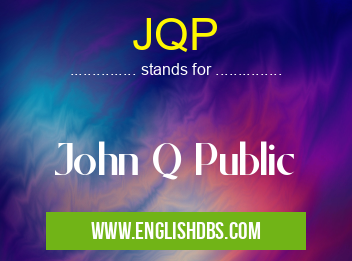What does JQP mean in UNCLASSIFIED
JQP stands for John Q Public, an anonymous American citizen which is used to describe the average person in the United States. It is an ideal representation of the “Person on the Street” and is used to provide a general or hypothetical example of how a regular person without influence or insider information would think or act. JQP can be used as a way to explain complex topics or concepts by using a common example that everyone is familiar with.

JQP meaning in Unclassified in Miscellaneous
JQP mostly used in an acronym Unclassified in Category Miscellaneous that means John Q Public
Shorthand: JQP,
Full Form: John Q Public
For more information of "John Q Public", see the section below.
Definition
JQP stands for John Q Public and it is an imaginary person used by many different groups such as newspapers, media outlets, marketers, and politicians as an example of what the average American citizen would think or do. When referencing JQP, it can be assumed that this individual has no special knowledge or access to insider information that could influence their decisions, making them a perfect representation of the ‘Person on the Street’.
Usage
JQP is typically used in situations where a hypothetical illustration of how someone without any special knowledge might approach something needs to be presented. For instance, when trying to explain why an important decision needs to be made it could be shown how the average voter would view it. By using JQP in these scenarios, it serves as a clear and easily understood example of what most people would consider when looking at an issue. Similarly this phrase can be employed in marketing campaigns where companies want to demonstrate how their products are beneficial even to those who don’t have inside information about them. In all cases, JQP serves as representative of the public opinion and is meant to show how regular people understand things.
Essential Questions and Answers on John Q Public in "MISCELLANEOUS»UNFILED"
What is John Q Public?
John Q Public, also known as JQP, is an imaginary representation of the average American citizen. It is used by businesses and organizations to help illustrate the impact of their decisions on the public at large.
How can JQP be helpful for businesses?
JQP can be a useful tool for businesses to consider when making decisions about customer service, pricing strategies, and other areas that affect their relationships with the public. By factoring in a general understanding of what an average consumer may expect from a company, businesses can better serve customers and create equitable policies that benefit everyone involved.
What type of data does JQP use to make decisions?
When making decisions based on the perspective of JQP, entities typically utilize a variety of sources such as surveys conducted among consumers, industry research compiled from national or regional markets, socioeconomic data obtained from local governments, and current market trends. All this information is then weighed together to help form more informed conclusions about how best to move forward with business plans.
Is there any downside to JQP?
While utilizing the perspective of John Q Public can provide helpful insights to enterprises looking to make informed decisions about their strategies or policies, it is not without its limitations. The biggest disadvantage associated with considering the hypothetical needs and expectations of an average person is that it can lead companies to ignore the voices and concerns of marginalised communities who may not be adequately represented in market research studies or socioeconomic datasets. As companies always strive towards being inclusive in their decision-making processes, it is important for them to find ways to hear everyone’s voice in order to form an accurate picture of their local markets.
Are there any methods for including marginalized communities in market research?
Yes! Many companies are starting to recognise the importance of including different perspectives in their research strategies by taking steps like reaching out directly to underrepresented populations with targeted interviews or creating panels made up exclusively of members from those groups so they have a strong voice as well. This helps create a holistic picture that accurately reflects current trends among diverse segments within their respective markets so they can better adjust their policies accordingly.
Does using JQP give entities an advantage over competitors?
While utilizing perspective such as John Q Public can certainly yield positive results by allowing companies to create fairer policies in which everyone benefits regardless of socio-economic background or identity; at its core it really only acts as another tool available among many that businesses use today when planning out strategy or policy reforms. Whether one enterprise has better results than another often comes down largely upon things like effective implementation rather than simply having access to certain types of information.
Is there any way I can learn more about JQP?
Absolutely! To learn more about John Q Public and how he has been used historically by organizations all over the world you could start by checking out academic publications on social science topics such as consumer psychology and economic behaviourism; both which heavily incorporate concepts related to our hypothetical “average individual” into their analyses. Additionally you could keep up with industry news outlets which often cover new initiatives implemented through the lens of John Q Public due his general popularity among modern business leaders.
Final Words:
The term JQP stands for John Q Public which refers to an imaginary American citizen who represents the ‘Person on the Street’ viewpoint. This phrase is often used in various industries such as newspapers, media outlets, marketers, and politics as a way to represent what most people without any special information would think or do about certain issues or products.. It provides clarity and helps simplify complex topics by providing easy-to-understand examples that are relatable for everyone, regardless of their level of knowledge on specific subjects .
